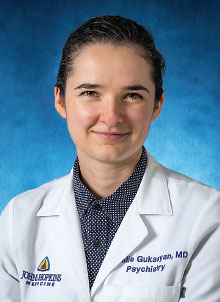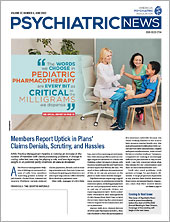A study on the safety and efficacy of psilocybin-assisted therapy in a therapeutic setting in 24 participants with major depressive disorder found that the hallucinogen provided rapid and substantial antidepressant effects lasting up to one year with no serious adverse effects. The long-term efficacy and safety of such treatment, however, are not known.
The study, conducted by researchers at the Johns Hopkins Center for Psychedelic and Consciousness Research (CPCR) in the Department of Psychiatry and Behavioral Sciences in Baltimore, was published in February in the Journal of Psychopharmacology and augments research previously published in JAMA Psychiatry.
The 24 participants were randomized to either an immediate or eight-week delayed treatment protocol, involving a combination of psilocybin sessions and supportive psychotherapy. Each participant received two doses of psilocybin and were followed for up to a year.
Lead author Natalie Gukasyan, M.D., an assistant professor of psychiatry and behavioral sciences at Hopkins and medical director of the CPCR, and colleagues reported “large decreases from baseline using the standardized Hamilton Depression Rating Scale (GRID-HAMD) scores at one, three, six, and 12-month follow-up.” The principal investigator was Roland Griffiths, Ph.D., director of the CPCR.
At 12 months, 75% of the 24 participants achieved “treatment response”—defined as a reduction of 50% or greater in GRID-HAMD score from baseline; 58% of the participants achieved remission—defined as a GRID-HAMD score less than or equal to 7. Self-reported measures, including the Quick Inventory of Depressive Symptomatology (QIDS) and the Beck Depression Inventory II (BDI-II), were consistent with the GRID-HAMD outcomes.
One intriguing finding was that “participant ratings of personal meaning, spiritual experience, and mystical experience after sessions predicted increased well-being at 12 months but did not predict improvement in depression.”
The researchers employed the 30-item revised Mystical Experience Questionnaire (MEQ30) to evaluate spiritual and mystical experience. The instrument was developed from a survey of mystical-type experiences associated with the use of psilocybin. In a study explaining the MEQ30 published in 2015 in the Journal of Psychopharmacology, mystical experiences were defined as having a number of dimensions, including unity, sacredness, noetic quality (in this context, a sense of revelation hard to verbalize), ineffability, positive mood, and transcendence of time and space—with the authors emphasizing that a totality of these dimensions must occur to qualify as a complete mystical experience. The authors of that study further noted that “mystical experience is not conceptually limited to religious experience or practice. ...”
The finding of a divergence between remission or improvement in major depression and self-reported well-being “is a somewhat counterintuitive part of our results,” Gukasyan commented. The research team was focused on determining which acute drug effects were helpful in predicting depression, she noted. Many studies of psilocybin-assisted therapy—including those whose participants had symptoms of anxiety and depression secondary to a terminal cancer diagnosis—have found that subjective ratings such as mystical experience were correlated with longer-term changes from baseline in depressive symptoms, Gukasyan said.
“The important thing to understand about well-being scores is that they are not changes from baseline, but rather absolute scores taken at follow-up time points derived from a questionnaire that asks where participants continue to experience persisting changes in their well-being that they attribute to the psilocybin therapy,” Gukasyan added. “Taken together, these results suggest that the types of features we asked about—personal meaning, spiritual significance, mystical experience, and so on—did not help us predict magnitude of depression.”
The finding may indicate that there are quality of life elements that are improved in people with major depression after psilocybin therapy that are not captured by depression severity scores in the GRID-HAMD and similar measures, she observed. This is an area that needs further exploration using instruments that better measure how well-being changes from baseline following psilocybin therapy, she said.
Psychiatrist Charles Grob, M.D., a professor of psychiatry and biobehavioral sciences and pediatrics at the David Geffen School of Medicine at UCLA, has studied the therapeutic utility of psychedelic drugs for decades. The new Hopkins study “furthers the growing interest in the potential safety and utility of the psychedelic treatment model as an alternative—albeit novel—psycho-spiritual therapy and will likely catalyze future studies that examine even longer post-treatment time spans in order to measure the full durability of psilocybin treatment,” Grob told Psychiatric News.
The divergence between self-reported findings of enhanced personal meaning and spirituality versus antidepressant measures requires further study to better understand the significance of the data, Grob said. ■

